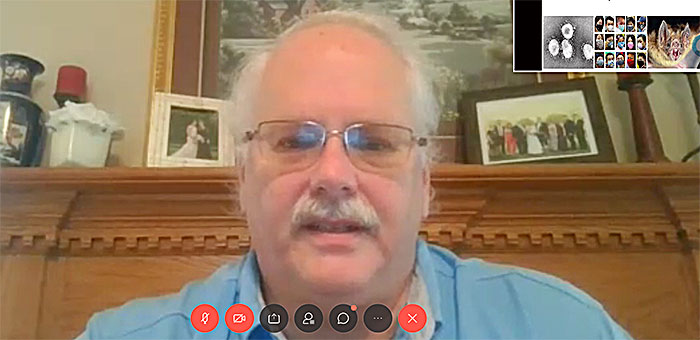Virtual Meetings, More a Glimpse of the Future in Pandemic Era

Speaking via online video conference as part of the U.S. Army Medical Research and Development Command's (USAMRDC) annual Spring Research Festival on April 29, University of North Carolina Professor of Epidemiology Dr. Ralph Baric offered a rather unique perspective on the current COVID-19 pandemic.
"I'll just remind everyone that more people have died from viral disease in the 20th century than all the wars combined," said Baric, delivering the opening remarks of his keynote presentation from his home due to social distancing guidelines.
Given that rough estimates of global wartime deaths over the last century alone top more than 108 million, Baric's point is clear: viruses like COVID-19 – or many of the other coronavirus strains that he's dedicated his life to researching – pose a significant threat to global populations and should be treated as such.
Indeed, Baric's address – which featured discussion on, among other items, the growth and general evolution of all coronaviruses over previous centuries – reveals not only the importance of continued research on the pandemic, but also stands as a testament to USAMRDC efforts to maintain the flow of key information in an environment impacted by the fallout. To wit, Baric's presentation was virtually attended by more than 200 members of the USAMRDC community. Given that the Spring Research Festival – which is now in its 24th year, and which serves as an event for scientists and the community to both collaborate and learn about research at Fort Detrick and the National Cancer Institute at Frederick – attracts nearly one thousand attendees per year, the attendance for Baric's address can be seen as a substantial victory.

Brigadier General Michael J. Talley, the Commanding General of the USAMRDC and Fort Detrick, Maryland, began leaning on similar virtual town hall-style meetings once the pandemic's impact on daily business routines became clear in early March, and has continued such communication efforts through the duration of the COVID-19 battle. Outside of updates on the Command's progress in fighting the virus, such meetings usually additionally include matters of USAMRDC-specific importance, as well as standard reminders to fight the pandemic via proper hand-washing and social distancing techniques.
Said Talley during a joint virtual town hall meeting in March with Command, Garrison, and local Frederick, Maryland, county officials, "I am committed to doing everything to keep you healthy, and to keep us Mission ready."
These same practices – maintaining an open flow of communication while also actively seeking to slow the spread of the virus – may become, at least in the short term, part of USAMRDC protocol. The annual USAMRDC Gains in Education of Mathematics and Science (GEMS) program, which is designed to promote science, technology, engineering, and math education among grade school and high school students alike, may soon turn to the virtual domain as a necessity.
"We are monitoring the coronavirus situation and are exploring every avenue possible to hold a safe and exciting Gains in the Education of Mathematics and Science (GEMS) program for the summer of 2020," said USAMRDC GEMS Program Coordinator Lauren Beeson. "The GEMS program at Fort Detrick is exploring a virtual option and currently building the best curriculum for our students."
For a program that hosted more than 1800 students at USAMRDC labs nationwide last year – with nearly 600 of those attending at the USAMRDC headquarters location in Frederick – and one centered around a variety of hands-on science and engineering projects, a virtual program would be a step in a markedly different direction from years past.
Regardless, the flow of pertinent information related to COVID-19 from all corners of the Command remains essential, and is predicated on successful adaptation to new methods of both disseminating and receiving material. In fact, Baric himself made what serves as a tacit nod to this possibility when he noted, near the close of his Spring Research Festival seminar, "[The pandemic] is a terrible situation and is still spreading rapidly throughout the nation."
If that's the case, USAMRDC will surely be asked to refine these relatively new methods of mass communication to suit both its personnel and its overall Mission.
 An official website of the United States government
An official website of the United States government
 ) or https:// means you've safely connected to the .mil website. Share sensitive information only on official, secure websites.
) or https:// means you've safely connected to the .mil website. Share sensitive information only on official, secure websites.


